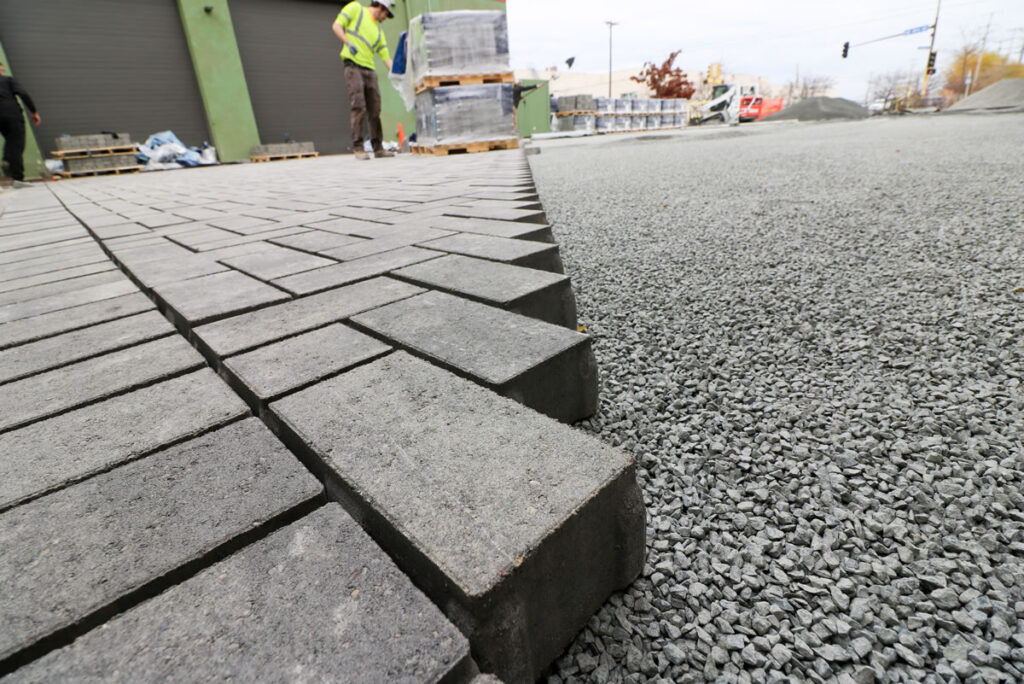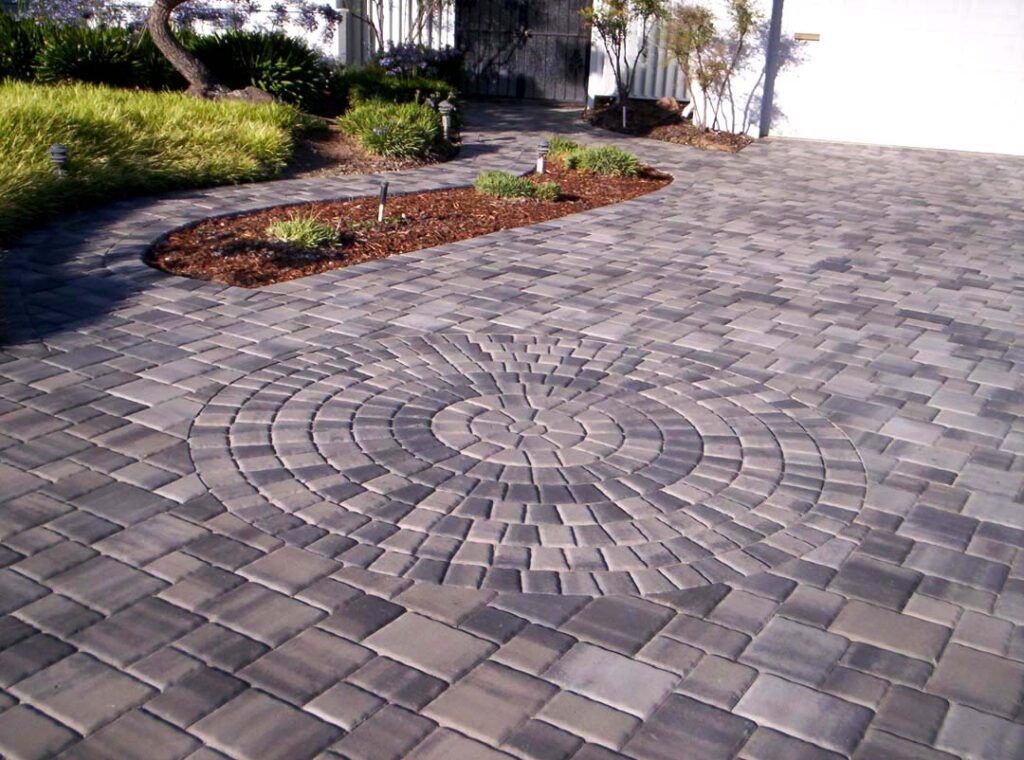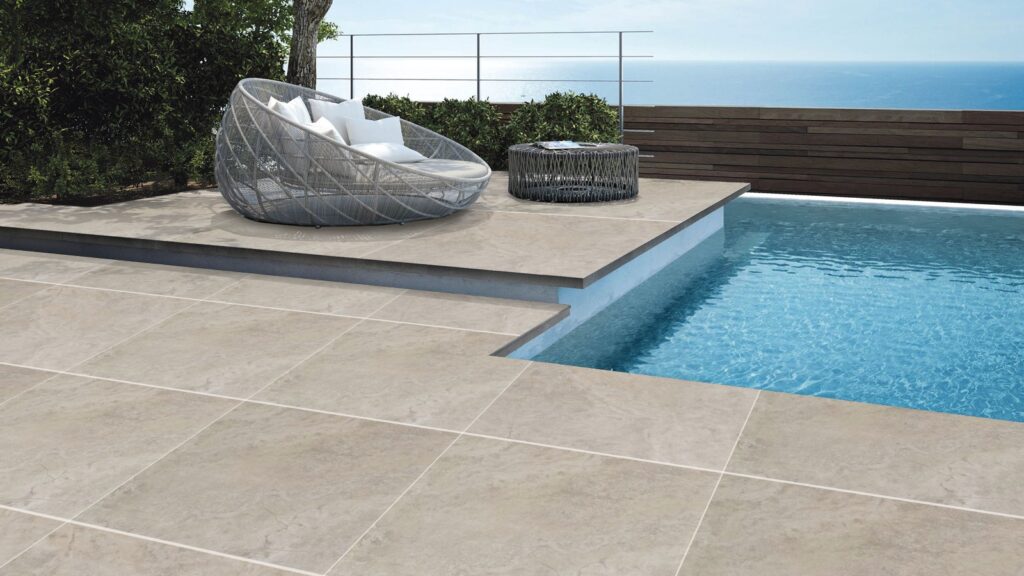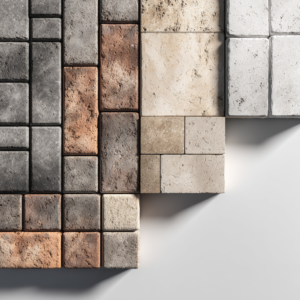In recent years, pavers have become a popular choice for outdoor landscaping projects due to their versatility, durability, and aesthetic appeal. But exactly how thick are pavers?
Pavers can be made of concrete, brick, natural stone, or porcelain – coming in various shapes, sizes, and colors. They allow homeowners and designers to create unique and visually appealing pathways, driveways, and patios.
But one crucial – and often overlooked – aspect of pavers that significantly contributes to their performance and longevity is their thickness. That’s what we want to focus on in this article: presenting you with a complete guide on how thick are pavers.

Jump to:
How thick are pavers?
Pavers come in three different ranges of thicknesses, each serving a specific purpose and catering to different applications. The thickness of pavers can be influenced by factors such as the intended use, the type of material, and the overall design requirements of the project.
Standard thickness
The most common thickness for pavers is around 2 3/8 inches (60mm). This standard thickness is suitable for pedestrian areas, walkways, patios, and light-duty driveways. The 2 3/8-inch thickness strikes a balance between cost-effectiveness and durability, making it a popular choice for residential projects.
Heavy-duty thickness
Heavy-duty pavers are recommended for driveways and areas subject to heavier loads.
Pavers with a thickness of 3 inches (80mm) or more provide enhanced structural integrity and can withstand the weight of vehicles without compromising their integrity. These heavy-duty pavers are often used in commercial settings, industrial areas, or for homeowners with larger vehicles.
Thin pavers
In some cases, thin pavers with a thickness of less than 2 inches may be used for overlay projects. These pavers are applied over existing surfaces, providing a cost-effective solution for renovating old concrete or asphalt driveways without the need for complete removal.
How thick are pavers: choosing the right thickness
Determining the appropriate thickness for pavers in a specific project involves a multifaceted evaluation, taking into account several crucial factors. These considerations play a pivotal role in ensuring the durability, stability, and overall success of the pavement installation – so let’s discuss some of them in depth.
Traffic load and type
The amount and type of traffic the paved area will endure significantly impact the required thickness. Heavy-duty applications, such as driveways or commercial parking lots, demand thicker pavers to withstand the constant load and potential stress.
Subgrade stability
The stability and composition of the subgrade beneath the pavers are critical. A strong, well-compacted subgrade provides a solid foundation, reducing the need for thicker pavers. Conversely, unstable or soft subgrades may necessitate thicker pavers to distribute the load more effectively.
Climate and weather conditions
Regional weather patterns, including freeze-thaw cycles, intense heat, or heavy rainfall, can affect the performance of pavers. In areas prone to freeze-thaw cycles, thicker pavers can resist cracking caused by the expansion of water during freezing.
Intended use and functionality
The intended use of the paved surface is a key determinant. Areas designed for pedestrian traffic may require thinner pavers compared to those intended for vehicular use. Additionally, considerations like wheelchair accessibility and furniture loads should be factored into the decision.
Aesthetic design and pattern
The desired aesthetic, including the choice of paver pattern and design, can affect the thickness requirement. Certain intricate patterns or designs may require thicker pavers to maintain structural integrity, especially if the design involves irregular shapes or interlocking components.

How thick are pavers: choosing the right material
Concrete pavers
- Thin: Concrete pavers at the thinner end of the spectrum are ideal for pedestrian areas, such as patios and walkways. Their lighter weight and ease of installation make them a popular choice for DIY projects.
- Standard: These pavers strike a balance between aesthetics and load-bearing capacity. They are suitable for driveways and areas with moderate vehicular traffic.
- Heavy-duty: For heavy-duty applications like commercial driveways or areas with constant heavy traffic, thicker concrete pavers are recommended. The added thickness enhances the overall strength and durability.
Natural stone pavers
- Thin: Natural stone pavers at the thinner end of the spectrum are best suited for foot traffic areas like garden pathways. They provide an elegant and rustic appearance while maintaining ease of installation.
- Standard: This thickness range is suitable for patios and pool decks. The additional thickness adds durability while preserving the aesthetic appeal of natural stone.
- Heavy-duty: For heavy-duty applications and high-traffic areas, thicker natural stone pavers are recommended. These can withstand the weight of vehicles and provide long-lasting beauty.
Brick pavers
- Thin: Thin brick pavers are ideal for creating intricate patterns in pedestrian areas like walkways and patios. They are relatively easy to handle and install.
- Standard: Suitable for driveways and areas with moderate vehicular traffic, standard-thickness brick pavers provide a balance between aesthetic appeal and durability.
- Heavy-duty: Thick brick pavers are recommended for heavy-duty applications such as commercial driveways or areas with constant heavy traffic. The added thickness enhances their ability to withstand the load.
Porcelain pavers
- Thin: Thin porcelain pavers are perfect for creating stunning walkways, patios, and other pedestrian zones. Their lighter weight makes them easy to handle and install, providing an elegant and modern surface for foot traffic.
- Standard: For areas with a mix of foot traffic and occasional furniture movement, standard-thickness porcelain pavers strike a balance between aesthetics and durability. They are also a suitable choice for residential driveways or areas with light vehicular traffic.
- Heavy-duty: Thick porcelain pavers are designed for heavy-duty applications such as driveways and commercial spaces with constant high traffic. In commercial settings where durability is paramount, thick porcelain pavers are also recommended.

Professional installation at JS Brick
As you can see, between the different thicknesses and materials, there are many pavers you can choose from for your project. To make the right decision, your best course of action is to hire professional hardscape contractors to help you choose between all these options.
That’s a service we here at JS Brick have been doing for the past 24 years, so we know the importance of careful planning when choosing the right pavers for a project. So find a professional you can trust around your area to help you.
If you are in Sarasota County, FL, you can always contact us for a free estimate on our services so we can start helping you and add you to our long list of satisfied customers.



